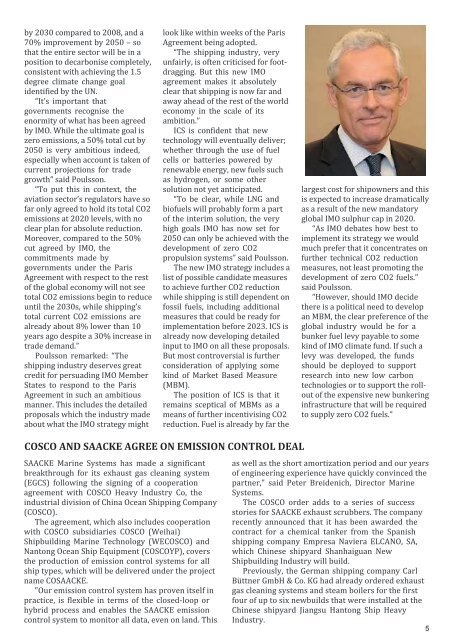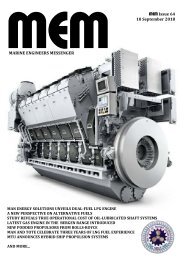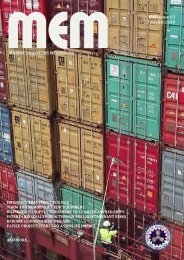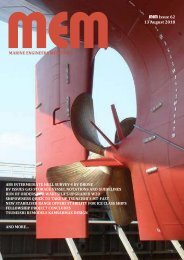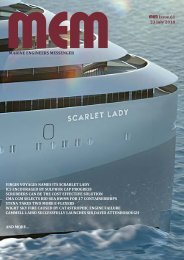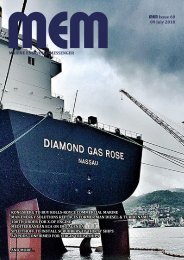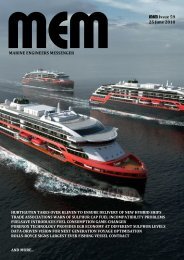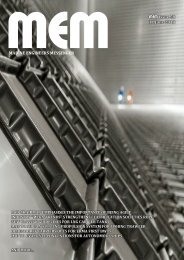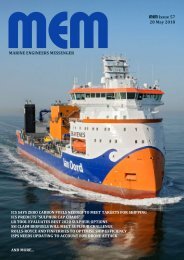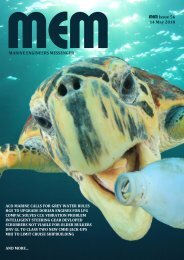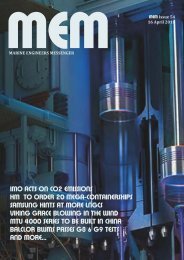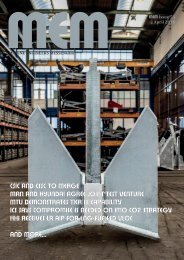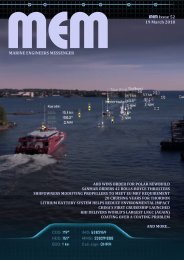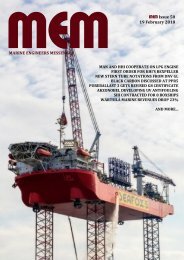Create successful ePaper yourself
Turn your PDF publications into a flip-book with our unique Google optimized e-Paper software.
y 2030 compared to 2008, and a<br />
70% improvement by 2050 – so<br />
that the entire sector will be in a<br />
position to decarbonise completely,<br />
consistent with achieving the 1.5<br />
degree climate change goal<br />
identified by the UN.<br />
“It’s important that<br />
governments recognise the<br />
enormity of what has been agreed<br />
by IMO. While the ultimate goal is<br />
zero emissions, a 50% total cut by<br />
2050 is very ambitious indeed,<br />
especially when account is taken of<br />
current projections for trade<br />
growth” said Poulsson.<br />
“To put this in context, the<br />
aviation sector’s regulators have so<br />
far only agreed to hold its total CO2<br />
emissions at 2020 levels, with no<br />
clear plan for absolute reduction.<br />
Moreover, compared to the 50%<br />
cut agreed by IMO, the<br />
commitments made by<br />
governments under the Paris<br />
Agreement with respect to the rest<br />
of the global economy will not see<br />
total CO2 emissions begin to reduce<br />
until the 2030s, while shipping’s<br />
total current CO2 emissions are<br />
already about 8% lower than 10<br />
years ago despite a 30% increase in<br />
trade demand.”<br />
Poulsson remarked: “The<br />
shipping industry deserves great<br />
credit for persuading IMO Member<br />
States to respond to the Paris<br />
Agreement in such an ambitious<br />
manner. This includes the detailed<br />
proposals which the industry made<br />
about what the IMO strategy might<br />
look like within weeks of the Paris<br />
Agreement being adopted.<br />
“The shipping industry, very<br />
unfairly, is often criticised for footdragging.<br />
But this new IMO<br />
agreement makes it absolutely<br />
clear that shipping is now far and<br />
away ahead of the rest of the world<br />
economy in the scale of its<br />
ambition.”<br />
ICS is confident that new<br />
technology will eventually deliver;<br />
whether through the use of fuel<br />
cells or batteries powered by<br />
renewable energy, new fuels such<br />
as hydrogen, or some other<br />
solution not yet anticipated.<br />
“To be clear, while LNG and<br />
biofuels will probably form a part<br />
of the interim solution, the very<br />
high goals IMO has now set for<br />
2050 can only be achieved with the<br />
development of zero CO2<br />
propulsion systems” said Poulsson.<br />
The new IMO strategy includes a<br />
list of possible candidate measures<br />
to achieve further CO2 reduction<br />
while shipping is still dependent on<br />
fossil fuels, including additional<br />
measures that could be ready for<br />
implementation before 2023. ICS is<br />
already now developing detailed<br />
input to IMO on all these proposals.<br />
But most controversial is further<br />
consideration of applying some<br />
kind of Market Based Measure<br />
(MBM).<br />
The position of ICS is that it<br />
remains sceptical of MBMs as a<br />
means of further incentivising CO2<br />
reduction. Fuel is already by far the<br />
largest cost for shipowners and this<br />
is expected to increase dramatically<br />
as a result of the new mandatory<br />
global IMO sulphur cap in 2020.<br />
“As IMO debates how best to<br />
implement its strategy we would<br />
much prefer that it concentrates on<br />
further technical CO2 reduction<br />
measures, not least promoting the<br />
development of zero CO2 fuels.”<br />
said Poulsson.<br />
“However, should IMO decide<br />
there is a political need to develop<br />
an MBM, the clear preference of the<br />
global industry would be for a<br />
bunker fuel levy payable to some<br />
kind of IMO climate fund. If such a<br />
levy was developed, the funds<br />
should be deployed to support<br />
research into new low carbon<br />
technologies or to support the rollout<br />
of the expensive new bunkering<br />
infrastructure that will be required<br />
to supply zero CO2 fuels.”<br />
COSCO AND SAACKE AGREE ON EMISSION CONTROL DEAL<br />
SAACKE Marine Systems has made a significant<br />
breakthrough for its exhaust gas cleaning system<br />
(EGCS) following the signing of a cooperation<br />
agreement with COSCO Heavy Industry Co, the<br />
industrial division of China Ocean Shipping Company<br />
(COSCO).<br />
The agreement, which also includes cooperation<br />
with COSCO subsidiaries COSCO (Weihai)<br />
Shipbuilding Marine Technology (WECOSCO) and<br />
Nantong Ocean Ship Equipment (COSCOYP), covers<br />
the production of emission control systems for all<br />
ship types, which will be delivered under the project<br />
name COSAACKE.<br />
"Our emission control system has proven itself in<br />
practice, is flexible in terms of the closed-loop or<br />
hybrid process and enables the SAACKE emission<br />
control system to monitor all data, even on land. This<br />
as well as the short amortization period and our years<br />
of engineering experience have quickly convinced the<br />
partner," said Peter Breidenich, Director Marine<br />
Systems.<br />
The COSCO order adds to a series of success<br />
stories for SAACKE exhaust scrubbers. The company<br />
recently announced that it has been awarded the<br />
contract for a chemical tanker from the Spanish<br />
shipping company Empresa Naviera ELCANO, SA,<br />
which Chinese shipyard Shanhaiguan New<br />
Shipbuilding Industry will build.<br />
Previously, the German shipping company Carl<br />
Büttner GmbH & Co. KG had already ordered exhaust<br />
gas cleaning systems and steam boilers for the first<br />
four of up to six newbuilds that were installed at the<br />
Chinese shipyard Jiangsu Hantong Ship Heavy<br />
Industry.<br />
5


